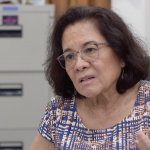
A study on indigenous women and children in Guyana is highlighting the many incidents of unregistered citizens, incest, abuse and teenage pregnancy in Amerindian communities.
Released on Wednesday by the United Nations Children Fund (UNICEF) and the Ministry of Indigenous People’s Affairs, the report stated that there is a need for all births in the hinterland region to be registered.
The findings of the study revealed that 21 percent of the indigenous children younger than five years old were not registered after birth. Moreover, while some children and adults were registered after birth, they never received their birth certificates.
Some factors that have influenced this situation include births occurring outside of health facilities and the bureaucracy involved in the process, making it difficult and hard to apply for birth registration.
UNICEF’s Resident Representative Sylvie Fouet said it was a serious development encouraged by a lack of facilities in the areas.
But both Minister Sydney Allicock and Valerie Garrido-Lowe were quick to indicate that the Ministry of Citizenship was already addressing the issue with mobile units set up in indigenous communities.
Allicock said in some cases, it has proven easier to get a birth certificate in neighboring Venezuela and Brazil because of the geography, something he said the government is definitely addressing.
The study also looked at violence, neglect, and abuse against indigenous women and children pointing out that incest is considered taboo in indigenous communities where fathers and stepfathers were sleeping with daughters and stepdaughters and also sexual activity was taking place among siblings.
The police in the area also claimed that these cases were never formally reported although they have heard that it happens in communities they patrol.

On the issue of teenage pregnancy, the report said it remains high among indigenous girls with the data showing that 21 percent of the adolescent girls have begun childbearing, a number that is six percent higher than the national rate.
Another area that needs attention is access to secondary education.
School dropouts are reported to be common in the hinterlands but the report also called for greater women empowerment and adolescent participation in decision making.
Some positives were that efforts were being made to preserve indigenous languages.
The team from Unicef and the Ministry observed that the study was the first to be undertaken in Guyana and Latin America and will guide policy decisions in the future to ensure development in the communities.
Minister Allicock went one step further to say that the study will also lend to a review and strengthening of the Indigenous Act. In so doing it will allow the government to make interventions to properly support indigenous and close gap between hinterland and coastland.
Describing the hinterland as an uneven playing field, the Minister welcomed the findings in the report.


















You must be logged in to post a comment Login